“UNIVERSITY AS A ‘LIVING LABORATORY’ OF ENVIRONMENT SUSTAINABILITY, SOCIAL CHANGE AND REGIONAL GROWTH”.
“We aim to be at the forefront, bridging the gap between research & policy to actual action & outcomes on the ground which benefit the common people particularly those most affected by the environmental degradation.”
Vice Chancellor Jamshed Bharucha
SRM AP’s social service initiatives, partnered infrastructure development and environment sustainability projects serve as a grassroots level engagement with communities in the surrounding clusters of villages – Saakhamuru, Thullur and Nelapadu to the north, Pedaparami and Kuragallu to the west, and Neerukonda and Nidamaru to its east.
Through the NSS wing SRM Andhra Pradesh delivers social programs to villages (Neerukonda and Kuragallu) and school adoptions (renovations and advisory) blood donation camps, first aid and cancer awareness, cleanliness drives, environment protection (substituting plastics with jute bags,) donations to temples and environment sustainable programs like the university’s 1-acre kitchen garden that grows vegetables as a co-op with local villagers. In partnership with communities SRM AP Amaravati invests in infrastructure projects – working with villagers to build link roads. On campus – mechanised plants and technologies enable the deployment of environment sustainability projects like organic waste management, water harvesting, power conservation units for lights, heating, and generators; sewage treatment plant (treated for gardening and cooling towers) and rooftop solar power generation.
As VC Dr. Bharucha explains it, these programs speak to the university’s broader vision on its role and responsibility to the community and to do so in a manner that is integrated with university academics and policy.

How important are sustainability and environmental issues and how can universities play a part and provide solutions?
Dr. Bharucha: The sustainability of our environment is a collective responsibility for all humans on this earth, for all governments, for all parents and of course for all educational institutions. There is a concept called the ‘tragedy of the commons’ where if each individual person or each family or each company or each nation only pursues their own narrow interests – nobody is looking out for their collective good. The environmental destruction, degradation, is a consequence of the tragedy of the commons where anyone can put pollutants into the atmosphere or into the water system believing that it somehow gets blown away, somehow gets washed away but the research now makes it clear that we all get affected by it. Our health is affected; our well-being is affected.
As an educational institution it is critical that we become models of using the latest scientific knowledge, social organisational policy-related knowledge and to leverage the passions that many of our students and faculty feel about the environmental issues to really set an example. Academia must integrate with real world initiatives – we aim to be a university united with its region in thought and action.

On our locational advantage versus being in an urban setting – working with the surroundings?
Dr. Bharucha: It is a dramatic advantage for us to be located where we are. We, as educators, often tell our students, ‘go outside your comfort zone, make the world a better place, tackle the world’s problems.” So as educational institution we are located in a place where we can actually make a difference as there is a lot work to be done here. Of course there is a lot work to be done everywhere but whether we are talking about clean water, or waste management or energy consumption or air pollution we are in an ideal place to be a living laboratory, to demonstrate how latest research and good organisation of people can create a model – of the university as custodian of key pillars of education, community responsibility, sustainable growth and progress for all. So what I’d like to see is that we start with our campus and consistently and rapidly increase the percentage of energy (that is renewable energy that does not put pollutant in the air). We will have 30% solar power which is a legal requirement but we will seek to go beyond that by integrating our scientific and engineering research on alternate forms of energy. We would like to see what could be done by way of biomass energy production – turn waste into energy. Even maybe turn plastics into energy and maybe untapped wind energy to harvest water, be mindful of the water table levels and to clean the canals and streets that immediately surround our campus, to recycle and eliminate use of plastic. Our aim is to get a campus that does these things and then expand our influence into our communities – street by street, house by house, block by block and eventually village by village.
Combine that with a policy institute that we are considering to create that brings together scholars, researchers, practitioners, and political leaders and activists that brings together their wisdom to devise innovative ways to come up with and look for successful existing models where we can succeed and work with local communities, community leaders, residents and the villagers to show how in fact this is beneficial to them and is not an elitist idea.

What are your thoughts on Self Help groups within the college, biodegradable recycling, working with farmers and teaching them about new technology and better methods of farming, water management, and garbage and waste disposals?
Dr. Bharucha: We have, in our main iconic building, a water management drainage system which is part of the architecture. Currently, the water is used to refresh the ground water and we need to take additional steps to store some of that water for the dry season to reduce the consumption of water that we receive from the municipal supply. We need to make sure that we monitor water quality. As of now, we have started testing it so on campus but we would like to extend that to the canal around our campus and make this information available to local communities and make them aware and understand the national/international standards are for drinking water so that we can reduce disease, particularly childhood diseases are results of and spread by water. So if we can take care of the quality of water, we can eliminate a lot of suffering, illnesses which all drags down the economy.
All of these are incredible ideas and I would like to thank the Hon’ble Member of Parliament, Ms. Meenakshi Lekhi to move forward on it. We would like to explore all of them and set us several committees that will bring together the expertise of our faculty and the passions of our students and then we can connect with the local communities, first with their leaders and also with other organisations which might be on the ground to see where we can make the most difference in any of these areas.
Our higher education institutions have been focussed on theoretical knowledge. It is much more difficult to actually work with cultural, linguistic issues, socio-economic issues in the community than it is to go out and spread the knowledge we have.
This is not something that universities know how to do well but they need to figure it out especially if they are to be potent engines of change for society and for policy.

What I hear from you is that you would like translate the philosophy of the university into a more a practical classroom model to a more practical hands-on experience. So are you planning to create a new classroom model where the students get enough practical experiences in addition to the theory and work with the surroundings?
Dr. Bharucha: The word practical has a lot of historical baggage so what I would say that we have been too theoretical, particularly in the Indian education system. We need to offer applications of it (the teachings imparted). Applications can occur at different levels. We can apply the scientific knowledge in the design of technology, the production of new product/system. One can also apply the knowledge in economics and social sciences, psychology and sociology to try to design organisations that do good community work.
Social entrepreneurship programs aimed at communities give students the opportunity to find where they fit along the spectrum from theoretical (pure sciences, curiosity-driven knowledge) to the practical, the day-to-day tangible, all of which are essential for a university.




- Published in Events
Christmas carnival at SRM AP

This Christmas, SRM AP campus witnessed a two day grand celebration. The student council and volunteers assisted by the Student Affairs department started the preparation 10 days back. The reception area and the grand staircase was decked up with christmas tree, snowman, gingerbread house and a crib.
Christmas Eve celebration on 24th began at 4pm in the reception area with cake cutting ceremony by Prof D Narayana Rao (Pro VC), Prof D Gunasekaran (Registrar), Wng Cmdr Venkataachalam Sekkappan (Director CLM) and Revathi B (Assistant Director- Student Affairs). The celebration then shifted to the grand staircase where the students sang christmas carols, followed by semi-classical dance by 1st year student- Sahithi. Other performances included western dance by Pavan. Antakshari was played among the students to add to the fun quotient. Post a sumptuous dinner, Home Alone was screened at night in the grand staircase.

On 25th evening, faculty and Ph. D scholars joined the students to celebrate Christmas. The wardens of the four hostel towers was given the task to decorate a christmas tree. Each of the residents including the faculty participated to win the best tree decorator award, which was won by the the tower four girls.

At 5 pm, the event kickstarted with fun games such as tug of war between boys and girls separately, passing the parcel and impromptu by 3rd year students- Aakansha Chauhan and Amina. Delicious butter cookies were baked and served before the special christmas dinner. At night, the students enjoyed the movie screening of Polar Express along with piping hot cups of hot chocolate. The Student Affairs department extended their heartfelt gratitude to Sukumar, a student who handled the PA system, Photography Society, and all the students and faculty for successfully pulling off this massive celebration that was enjoyed by all.

- Published in Events
Next Tech Lab students end the year with a win!
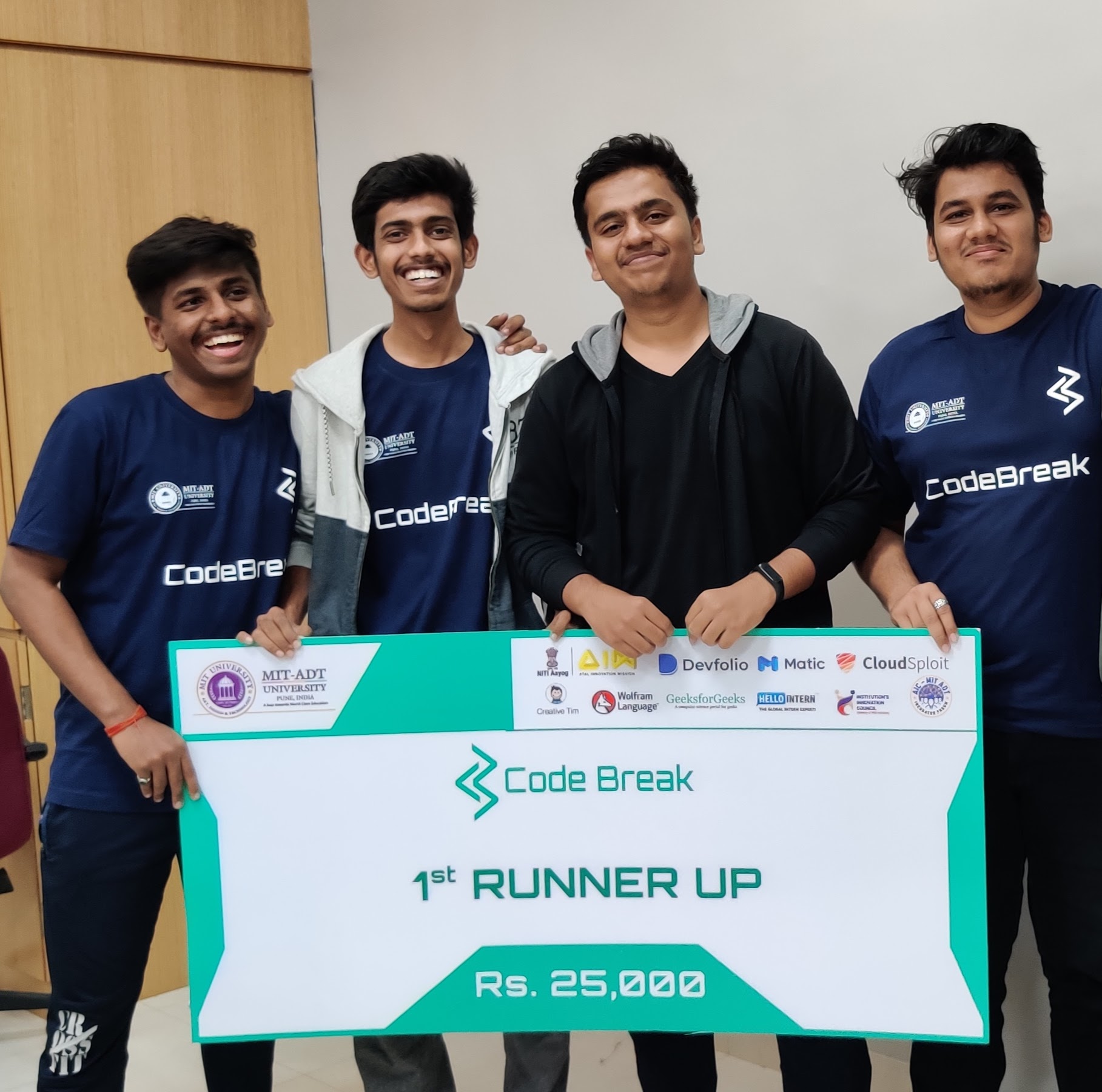
Next tech lab students achieve yet another milestone in Hackathon Codebreak 1.0 organized by MIT ADT University, Pune on 21st and 22nd December, 2019. The team- Rushank Jain, Suraj Maharana, Omkar Ingale, and Ajay Kumar participated from SRM AP in this national level hackathon, where they competed with students from IIIT, BITS, Bennet University, K.J. Somaiya and many more. The panel of judges comprised of experienced personnel from IBM, Siemens, and Xpansion.
Our team built a Virtual Reality application that tackles tourism, medical and social issues. The students mitigated the challenge of not having a 360-degree camera by capturing images on their phone, and doing the laborious work of stitching more than 80 images and later, automated the process by utilizing their skills in OpenCV. The students surmounted all the quandaries and made it to the 1st runners up prize among 40 other teams.

The students expressed their gratitude to SRM University AP for providing the opportunity to attend this hackathon and for fortifying them throughout. “It was my first time participating in a competition at such a large platform. It was an amazing experience competing with so many brilliant minds and learning so much from the exchange. We are expecting 2020 to be full of achievements and fun”, says the young achiever of SRM AP- Rushak Jain.
- Published in Events
SRM AP welcomes the new year with grandeur!
“We felt at home away from home with our friends at SRM AP who have become family”- Apurba Kumar Howlader (3rd year, Mechanical Engineering).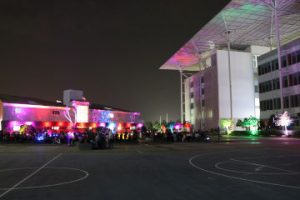
As dusk fell on the eve of the new year, an extravagant celebration was witnessed at the SRM AP campus. The basketball court was stunningly decorated with disco lights, a perfect backdrop for the celebration.
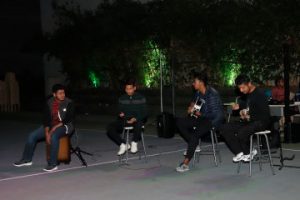
The ambiance was set with soulful performances by “Diversity”-the student’s band led by the lead vocalist Asim along with Suchet B Thapa on guitars, Srijan B Thapa with clap box, and Srijeet Tomrokar as an acoustic guitarist.
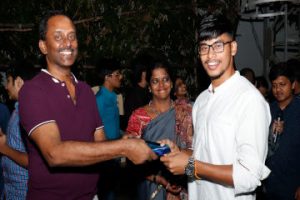
The new year is the time to cherish the fond memories of the passing year before bidding farewell to it. The students participated in the competition “Rewind 2019” where they had to create a video on their memorable moments spent in SRM AP. Sukumar (2nd year, Computer Science Engineering) bagged the first prize in the competition whereas, Parshal Chitrakar (3rd year, Computer Science Engineering) himself narrated his year’s journey on camera to become the runner up.
The much-awaited “DJ Night” began right after where the students grooved to English, Hindi, and Telugu music handpicked by Sukumar. “Nothing could have been better than this celebration right before the turn of the year where we got to spend time with our mates”, says Sreelekha Bhuvaneswari (2nd year, BSc.Physics)
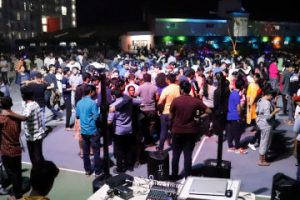
The countdown to 2020 began at midnight and soon enough skyrockets shot off to declare that we stepped into the new year. A cake-cutting ceremony by Wng Cmdr Venkataachalam Sekkappan (Director-CLM) marked the end of the day. Suchet B Thapa (3rd year, Mechanical Engineering) wraps it up aptly by saying, “The jazzy celebration is a 20 on 20 to begin the year 2020”.
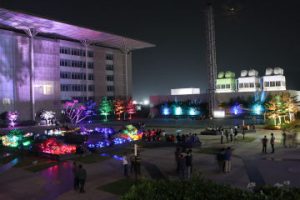 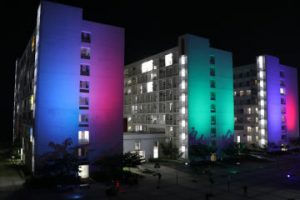 |
- Published in Events

